Module 5 My school day Unit 3 Language in use 课件22张PPT
文档属性
| 名称 | Module 5 My school day Unit 3 Language in use 课件22张PPT |
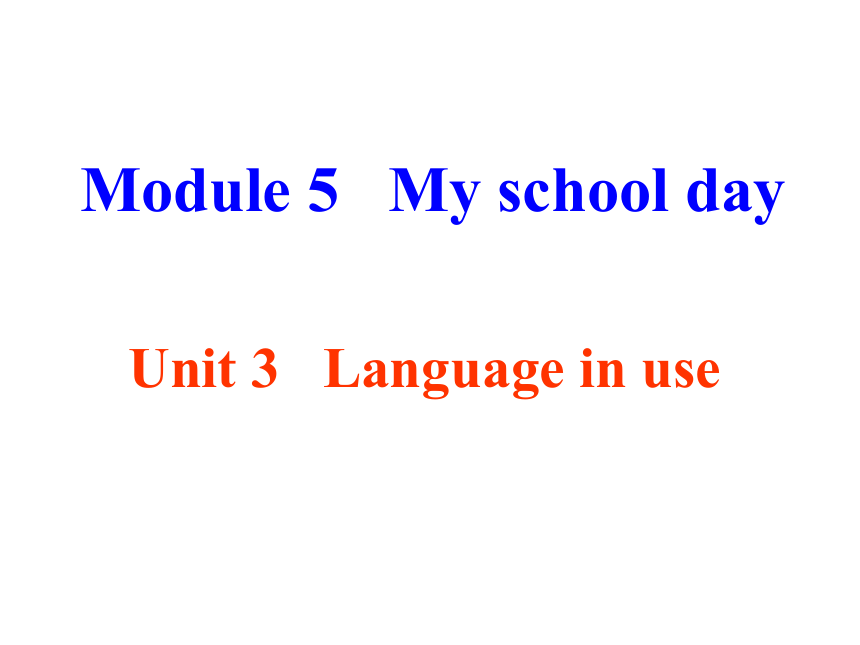
|
|
| 格式 | ppt | ||
| 文件大小 | 344.0KB | ||
| 资源类型 | 教案 | ||
| 版本资源 | 外研版 | ||
| 科目 | 英语 | ||
| 更新时间 | 2020-07-26 00:00:00 | ||
图片预览


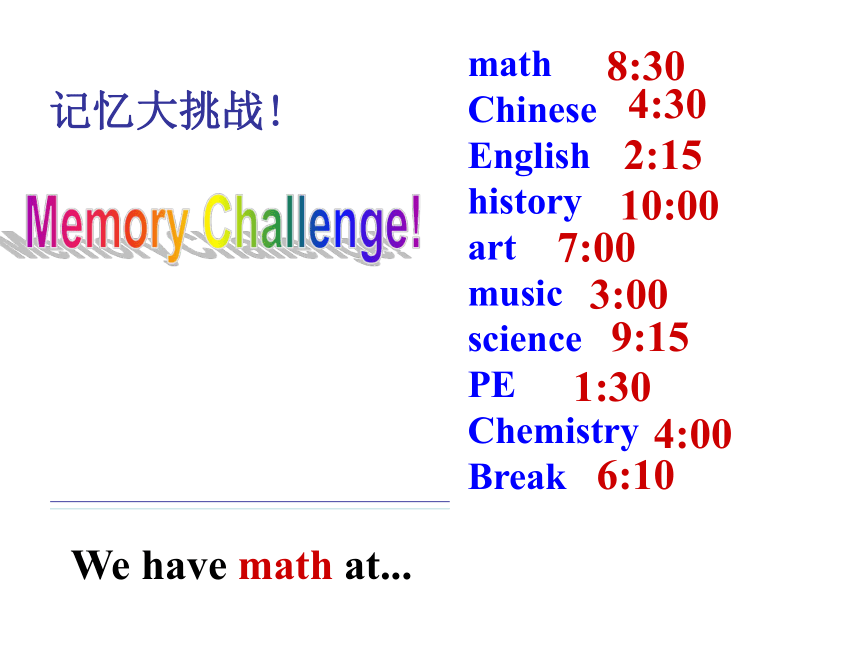
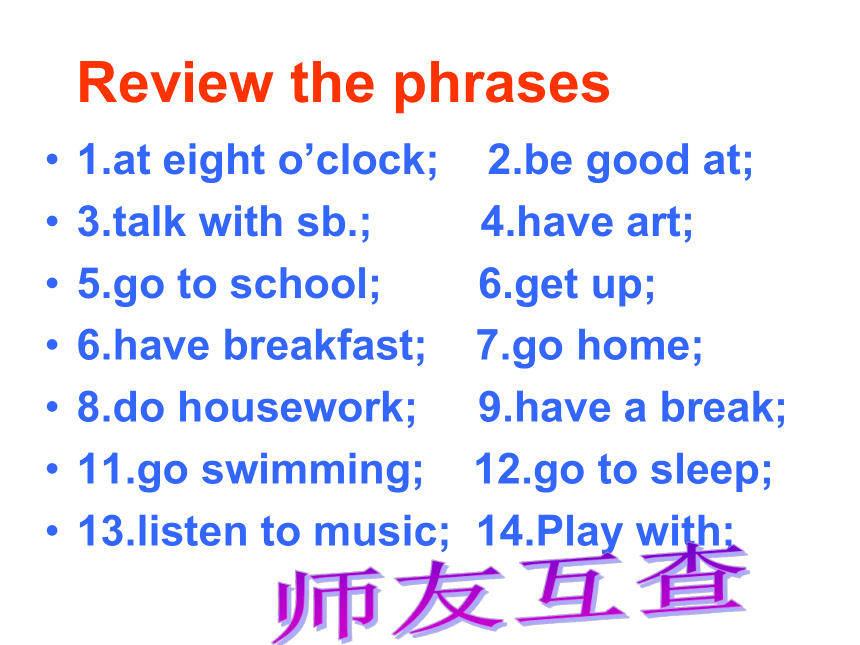
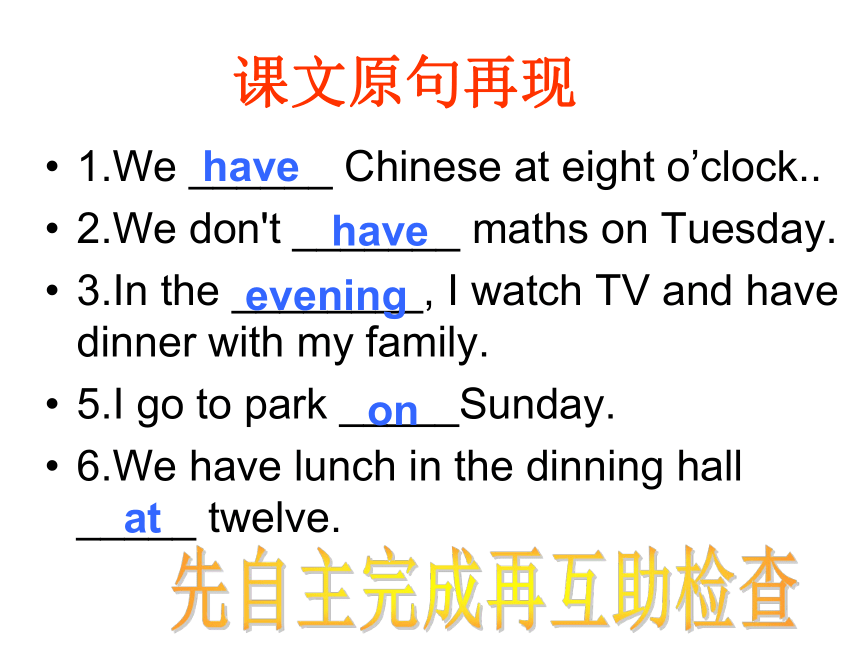
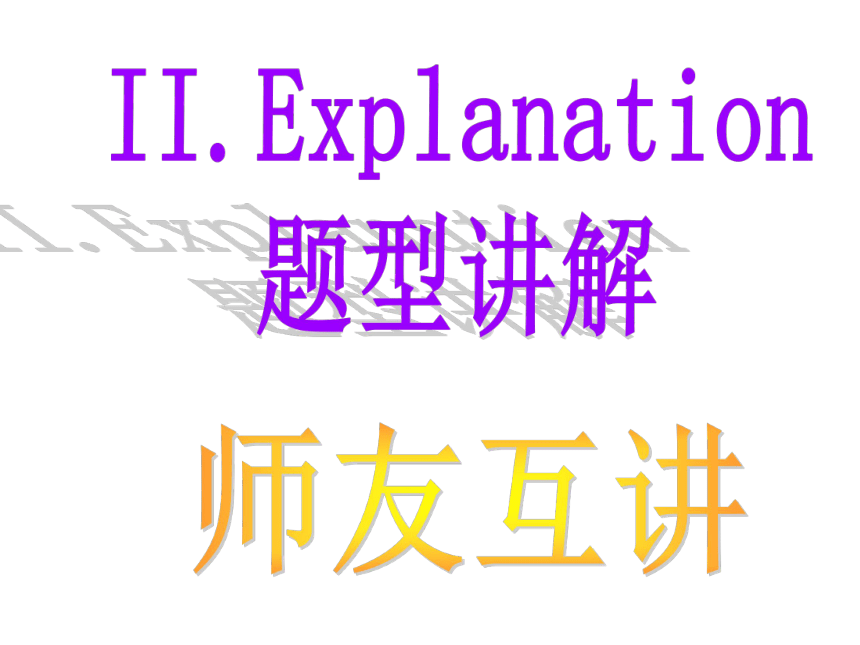
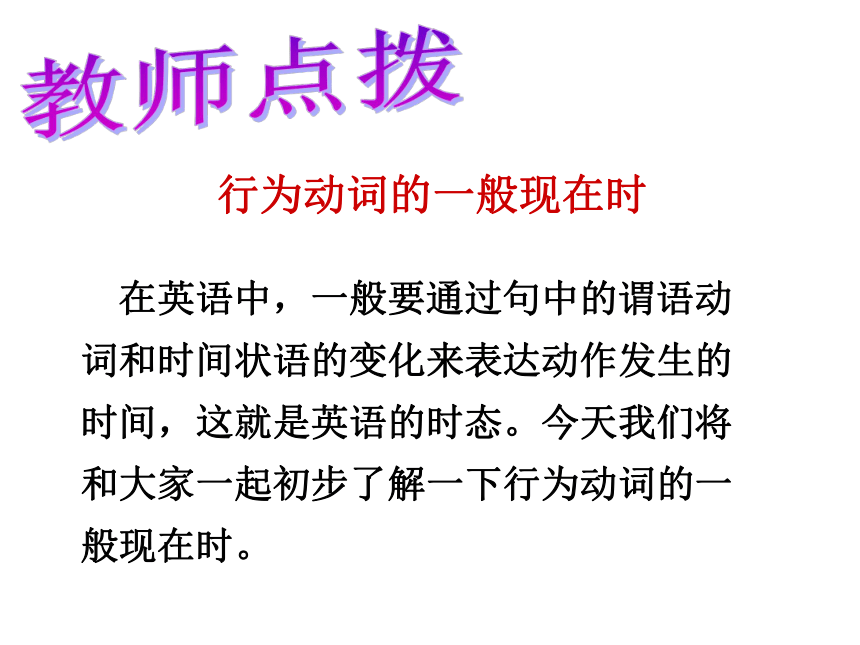
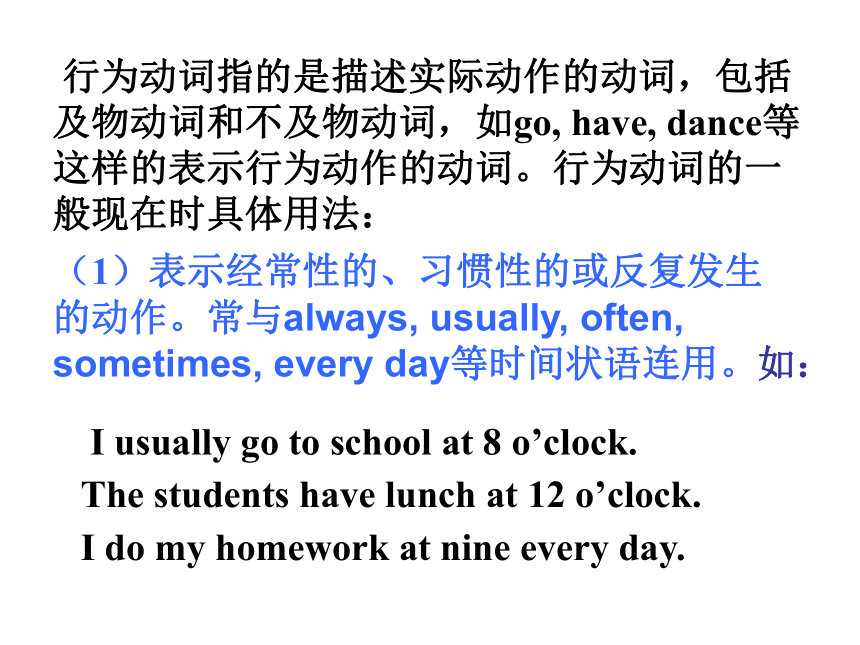
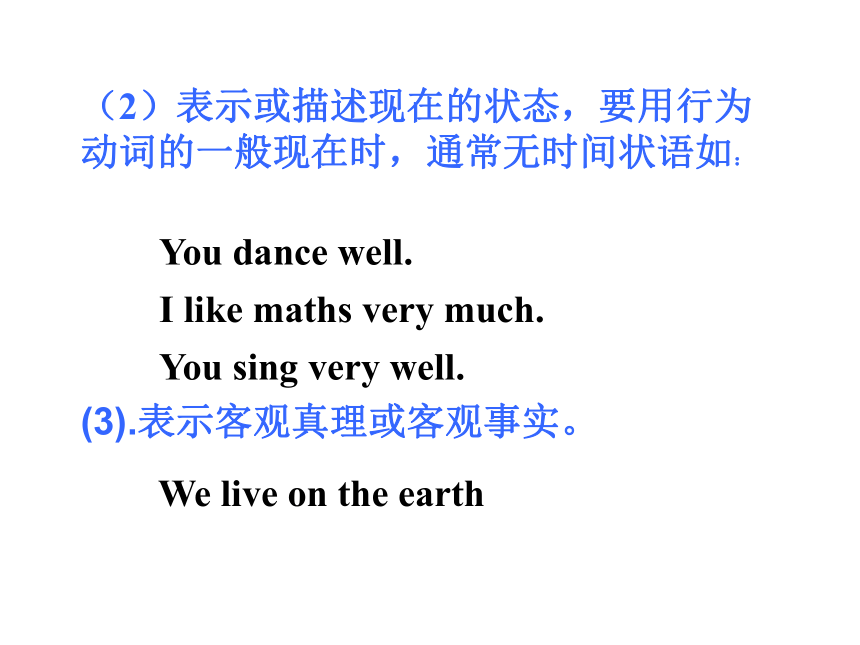
文档简介
Unit 3 Language in use
Module 5 My school day
math
Chinese
English
history
art
music
science
PE
chemistry
break
记忆大挑战!
art 7:00
Chinese 4:30
English 2:15
P.E. 1:30
Chemistry
4:00
music 3:00
history 10:00
Science 9:15
math 8:30
Break 6:10
Subjects
math
Chinese
English
history
art
music
science
PE
Chemistry
Break
记忆大挑战!
8:30
9:15
4:30
2:15
10:00
7:00
3:00
1:30
4:00
6:10
We have math at...
Review the phrases
1.at eight o’clock; 2.be good at;
3.talk with sb.; 4.have art;
5.go to school; 6.get up;
6.have breakfast; 7.go home;
8.do housework; 9.have a break;
11.go swimming; 12.go to sleep;
13.listen to music; 14.Play with;
课文原句再现
1.We ______ Chinese at eight o’clock..
2.We don't _______ maths on Tuesday.
3.In the ________, I watch TV and have dinner with my family.
5.I go to park _____Sunday.
6.We have lunch in the dinning hall _____ twelve.
have
have
evening
on
at
行为动词的一般现在时
在英语中,一般要通过句中的谓语动词和时间状语的变化来表达动作发生的时间,这就是英语的时态。今天我们将和大家一起初步了解一下行为动词的一般现在时。
行为动词指的是描述实际动作的动词,包括及物动词和不及物动词,如go, have, dance等这样的表示行为动作的动词。行为动词的一般现在时具体用法:
(1)表示经常性的、习惯性的或反复发生的动作。常与always, usually, often, sometimes, every day等时间状语连用。如:
I usually go to school at 8 o’clock.
The students have lunch at 12 o’clock.
I do my homework at nine every day.
(2)表示或描述现在的状态,要用行为动词的一般现在时,通常无时间状语如:
You dance well.
I like maths very much.
You sing very well.
(3).表示客观真理或客观事实。
We live on the earth
在行为动词作谓语的句子中当句子主语是 I ,we, you,they或表示复数概念的名词或代词时,一般现在时的陈述句结构为:
主语+行为动词原形 + 其他
如:I like English very much.
其否定句形式要借助于don’t (don’t是do not的缩写)结构为:主语+ don’t +行为动词原形 + 其他
如:I don’t like English very much.
疑问句则要借用助动词do(无意义),其结构为:
Do +主语+动词原形+其他?
如:Do you like English?
陈述句:I have lunch in the dining hall at twelve o’clock everyday.
否定句:I don't have lunch in the dining hall at twelve o’clock everyday.
疑问句:Do you have lunch in the dining hall at twelve o’clock everyday?
陈述句:They have an English class today.
否定句:They don’t have an English class today.
疑问句:Do they have an English class today?
巩固提升
III. 根据汉语提示,完成下列英文句子。(每空一词)
1. 我和爸爸妈妈去学校。
I __ __ _____ with my parents.
2. 我不喜欢这件外套。
I ____ _____ this coat.
3. 我们下午4点钟回家。
We ____ ____ at 4 o’clock in the afternoon.
4. 课不是3点开始。
Lessons _____ _____ at 3 o’clock.
5. 我们没有数学课, 你们呢?
We ___ _____ math. ___________ ______ you?
go to school
don’t like
go home
don’t start
don’t have
What / How about
在表示地点方面, at + 点, on + 面, in + 内。如:
at the table“在桌子旁”, 强调的是具体的地点;
on the chair“在椅子上”, 与椅子的面有接触,强调接触面;
in the room"在房间里", 强调内部空间。
at, in, on的用法
2. 在表示时间方面, in表示时间段, 即在较长的一段时间内,如:
in the afternoon, in a week, in autumn, in 1996
at通常表示时间点, 如: at six o’clock。
on表示具体的某一天或某天的某个时间, 如:
on Sunday, on Monday afternoon, on a cold winter morning, on my birthday。
We go to school ______ the morning.
We don’t go to school ______ Sunday.
I get up ______ half past six.
You have an English lesson _____ two o’clock.
They have a maths lesson ______ Wednesday.
I do my homework _______ the evening.
Complete the sentences with at, in or on.
in
on
at
at
on
in
Talk about your ideal school day.
I go to school at half past seven in the morning.
We start work at nine o’clock.
At eleven o’clock, we have a break in the playground and I talk to my friends.
…
I’m_____, a student at Shaohua Middle School. Every day I ____ at 6:30. I have breakfast at about ____. Then
I go to school____, because my home is not far from the school . I ___ to school at 7:20. At 7:30, I ____English and Chinese. Classes begin at 8:50. We _____ four classes in the morning. I have lunch at 12:00. We have four classes ____,too. I go home at 5:30. I ____at about 6:00
at home. Then I do my homework. I often ____CCTV news at 7:00. I go to bed at ____. What about your school day? Can you tell me, please?
老师示范
Write a passage about your ideal school day.
Writing
Talk about your ideal school day. The following phrases are helpful.
get up have breakfast
go to school lessons start
study Chinese / … have lunch
have … lesson after school
play football go home
have dinner / have supper go to bed
do your homework watch the news on TV
Homework
1. Finish the exercises in Lianxice.
2. Review important phrases in Module5.
3.Preview the new words and expressions in Module 6.
Module 5 My school day
math
Chinese
English
history
art
music
science
PE
chemistry
break
记忆大挑战!
art 7:00
Chinese 4:30
English 2:15
P.E. 1:30
Chemistry
4:00
music 3:00
history 10:00
Science 9:15
math 8:30
Break 6:10
Subjects
math
Chinese
English
history
art
music
science
PE
Chemistry
Break
记忆大挑战!
8:30
9:15
4:30
2:15
10:00
7:00
3:00
1:30
4:00
6:10
We have math at...
Review the phrases
1.at eight o’clock; 2.be good at;
3.talk with sb.; 4.have art;
5.go to school; 6.get up;
6.have breakfast; 7.go home;
8.do housework; 9.have a break;
11.go swimming; 12.go to sleep;
13.listen to music; 14.Play with;
课文原句再现
1.We ______ Chinese at eight o’clock..
2.We don't _______ maths on Tuesday.
3.In the ________, I watch TV and have dinner with my family.
5.I go to park _____Sunday.
6.We have lunch in the dinning hall _____ twelve.
have
have
evening
on
at
行为动词的一般现在时
在英语中,一般要通过句中的谓语动词和时间状语的变化来表达动作发生的时间,这就是英语的时态。今天我们将和大家一起初步了解一下行为动词的一般现在时。
行为动词指的是描述实际动作的动词,包括及物动词和不及物动词,如go, have, dance等这样的表示行为动作的动词。行为动词的一般现在时具体用法:
(1)表示经常性的、习惯性的或反复发生的动作。常与always, usually, often, sometimes, every day等时间状语连用。如:
I usually go to school at 8 o’clock.
The students have lunch at 12 o’clock.
I do my homework at nine every day.
(2)表示或描述现在的状态,要用行为动词的一般现在时,通常无时间状语如:
You dance well.
I like maths very much.
You sing very well.
(3).表示客观真理或客观事实。
We live on the earth
在行为动词作谓语的句子中当句子主语是 I ,we, you,they或表示复数概念的名词或代词时,一般现在时的陈述句结构为:
主语+行为动词原形 + 其他
如:I like English very much.
其否定句形式要借助于don’t (don’t是do not的缩写)结构为:主语+ don’t +行为动词原形 + 其他
如:I don’t like English very much.
疑问句则要借用助动词do(无意义),其结构为:
Do +主语+动词原形+其他?
如:Do you like English?
陈述句:I have lunch in the dining hall at twelve o’clock everyday.
否定句:I don't have lunch in the dining hall at twelve o’clock everyday.
疑问句:Do you have lunch in the dining hall at twelve o’clock everyday?
陈述句:They have an English class today.
否定句:They don’t have an English class today.
疑问句:Do they have an English class today?
巩固提升
III. 根据汉语提示,完成下列英文句子。(每空一词)
1. 我和爸爸妈妈去学校。
I __ __ _____ with my parents.
2. 我不喜欢这件外套。
I ____ _____ this coat.
3. 我们下午4点钟回家。
We ____ ____ at 4 o’clock in the afternoon.
4. 课不是3点开始。
Lessons _____ _____ at 3 o’clock.
5. 我们没有数学课, 你们呢?
We ___ _____ math. ___________ ______ you?
go to school
don’t like
go home
don’t start
don’t have
What / How about
在表示地点方面, at + 点, on + 面, in + 内。如:
at the table“在桌子旁”, 强调的是具体的地点;
on the chair“在椅子上”, 与椅子的面有接触,强调接触面;
in the room"在房间里", 强调内部空间。
at, in, on的用法
2. 在表示时间方面, in表示时间段, 即在较长的一段时间内,如:
in the afternoon, in a week, in autumn, in 1996
at通常表示时间点, 如: at six o’clock。
on表示具体的某一天或某天的某个时间, 如:
on Sunday, on Monday afternoon, on a cold winter morning, on my birthday。
We go to school ______ the morning.
We don’t go to school ______ Sunday.
I get up ______ half past six.
You have an English lesson _____ two o’clock.
They have a maths lesson ______ Wednesday.
I do my homework _______ the evening.
Complete the sentences with at, in or on.
in
on
at
at
on
in
Talk about your ideal school day.
I go to school at half past seven in the morning.
We start work at nine o’clock.
At eleven o’clock, we have a break in the playground and I talk to my friends.
…
I’m_____, a student at Shaohua Middle School. Every day I ____ at 6:30. I have breakfast at about ____. Then
I go to school____, because my home is not far from the school . I ___ to school at 7:20. At 7:30, I ____English and Chinese. Classes begin at 8:50. We _____ four classes in the morning. I have lunch at 12:00. We have four classes ____,too. I go home at 5:30. I ____at about 6:00
at home. Then I do my homework. I often ____CCTV news at 7:00. I go to bed at ____. What about your school day? Can you tell me, please?
老师示范
Write a passage about your ideal school day.
Writing
Talk about your ideal school day. The following phrases are helpful.
get up have breakfast
go to school lessons start
study Chinese / … have lunch
have … lesson after school
play football go home
have dinner / have supper go to bed
do your homework watch the news on TV
Homework
1. Finish the exercises in Lianxice.
2. Review important phrases in Module5.
3.Preview the new words and expressions in Module 6.
同课章节目录
- Starte
- Module 1 My teacher and my friends
- Module 2 My English lesson
- Module 3 My English book
- Module 4 My everyday life
- Module 1 My classmates
- Unit 1 Nice to meet you.
- Unit 2 I'm Wang Lingling and I'm thirteen years ol
- Unit 3 Language in use.
- Module 2 My family
- Unit 1 Is this your mum?
- Unit 2 These are my parents.
- Unit 3 Language in use.
- Module 3 My school
- Unit 1 There are thirty students in my class.
- Unit 2 The library is on the left of the playgroun
- Unit 3 Language in use.
- Module 4 Healthy food
- Unit 1 We've got lots of apples.
- Unit 2 Is your food and drink healthy?
- Unit 3 Language in use.
- Module 5 My school day
- Unit 1 I love history.
- Unit 2 We start work at nine o'clock.
- Unit 3 Language in use.
- Revision module A
- Module 6 A trip to the zoo
- Unit 1 Does it eat meat?
- Unit 2 The tiger lives in Asia.
- Unit 3 Language in use.
- Module 7 Computers
- Unit 1 How do I write my homework on the computer?
- Unit 2 When do you use a computer?
- Unit 3 Language in use.
- Module 8 Choosing presents
- Unit 1 I always like birthday parties.
- Unit 2 She often goes to concerts.
- Unit 3 Language in use.
- Module 9 People and places
- Unit 1 We're enjoying the school trip a lot.
- Unit 2 They're waiting for buses or trains.
- Unit 3 Language in use.
- Module 10 Spring Festival
- Unit 1 Are you getting ready for Spring Festival?
- Unit 2 My mother's cleaning our houses and sweepin
- Unit 3 Language in use.
- Revision module B
